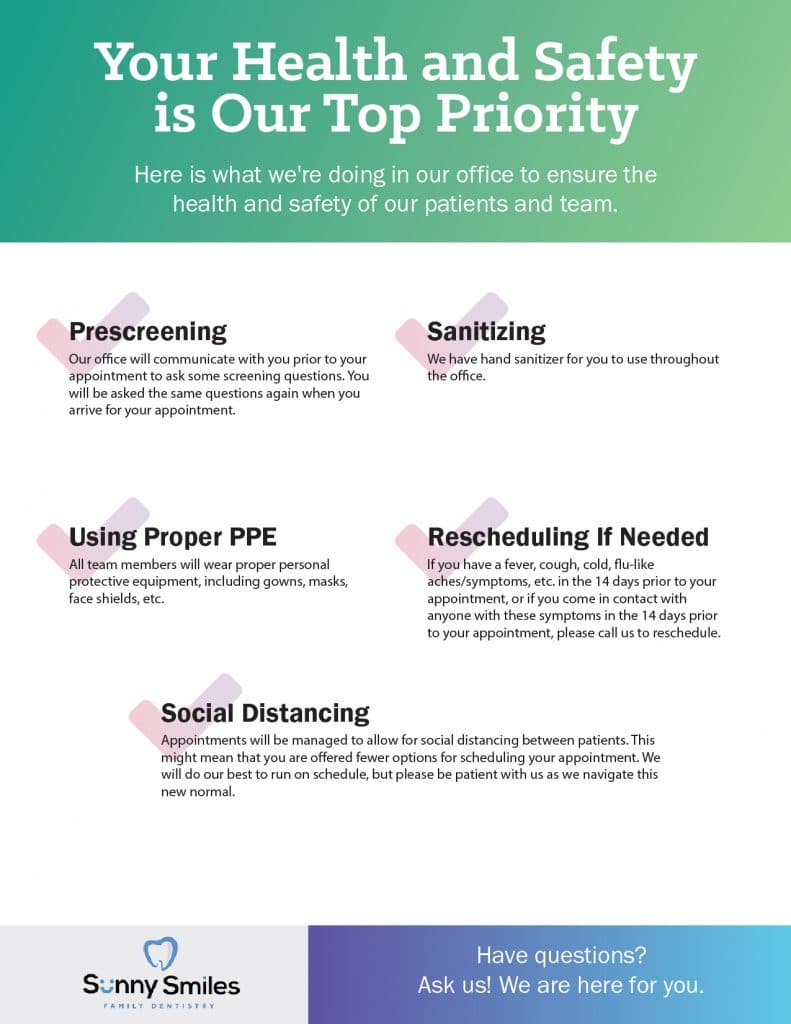 Your smile may never be the same again after you experience a dental injury…unless you talk to your dentist about addressing the problem, that is. Your El Paso, TX dentist’s office can discuss your options for treatment if you have a tooth that is chipped or cracked. The right cosmetic dental procedure can hide damage, while still preserving the natural appearance of your tooth. In fact, you might be surprised at how little alteration to your tooth can be required to restore the way it looks. You should know that if you ignore a dental injury, particularly one that causes discomfort, you can face a risk for worsening trouble over time. (more…)
Your smile may never be the same again after you experience a dental injury…unless you talk to your dentist about addressing the problem, that is. Your El Paso, TX dentist’s office can discuss your options for treatment if you have a tooth that is chipped or cracked. The right cosmetic dental procedure can hide damage, while still preserving the natural appearance of your tooth. In fact, you might be surprised at how little alteration to your tooth can be required to restore the way it looks. You should know that if you ignore a dental injury, particularly one that causes discomfort, you can face a risk for worsening trouble over time. (more…)
Arranging Your Smile Recovery With All-On-4 Implants
 When you think about how much trouble one missing tooth can cause an individual to experience, it should be easy to see just how serious it can be for someone to lose all of their upper or lower teeth. If this is already a problem affecting you, then imagining is no longer necessary. You can be well aware of how advanced tooth loss can impose drastic limits on your diet, and how it can hurt the way you look. Fortunately, your El Paso, TX dentist’s office is prepared to help you make your smile complete again with All-On-4 implants to hold a denture in place! (more…)
When you think about how much trouble one missing tooth can cause an individual to experience, it should be easy to see just how serious it can be for someone to lose all of their upper or lower teeth. If this is already a problem affecting you, then imagining is no longer necessary. You can be well aware of how advanced tooth loss can impose drastic limits on your diet, and how it can hurt the way you look. Fortunately, your El Paso, TX dentist’s office is prepared to help you make your smile complete again with All-On-4 implants to hold a denture in place! (more…)
Scheduling Dental Work After A Routine Oral Health Exam
 A typical preventive dental health care regimen would see you visiting your El Paso, TX dentist for semiannual dental appointments. When you do a good job protecting your smile, these visits can be the only trips you make to the dentist’s office. Unfortunately, patients sometimes receive bad news about the state of their smile, and need to schedule restorative dental work. If you find yourself in this position, you can be glad to know that your dentist can provide you with an attractive, durable restoration for a problem tooth. You can also be relieved to have a problem caught during treatment, before uncomfortable symptoms had the chance to start. (more…)
A typical preventive dental health care regimen would see you visiting your El Paso, TX dentist for semiannual dental appointments. When you do a good job protecting your smile, these visits can be the only trips you make to the dentist’s office. Unfortunately, patients sometimes receive bad news about the state of their smile, and need to schedule restorative dental work. If you find yourself in this position, you can be glad to know that your dentist can provide you with an attractive, durable restoration for a problem tooth. You can also be relieved to have a problem caught during treatment, before uncomfortable symptoms had the chance to start. (more…)
Dental Emergencies Happen – Your Dentist Can Help
 When dental trouble arises, seemingly without warning, you can be understandably alarmed. If you start to experience notable dental pain, or if an injury harms one or more of your teeth, your El Paso, TX dentist’s office is ready to help you manage the problem. By reaching out for emergency dental treatment, you can arrange for the problem’s prompt management. That means putting a stop to that discomfort, and having dental damage addressed with minimal delay. Your dentist is even prepared to take care of your smile if your emergency concerns the loss of a tooth. (more…)
When dental trouble arises, seemingly without warning, you can be understandably alarmed. If you start to experience notable dental pain, or if an injury harms one or more of your teeth, your El Paso, TX dentist’s office is ready to help you manage the problem. By reaching out for emergency dental treatment, you can arrange for the problem’s prompt management. That means putting a stop to that discomfort, and having dental damage addressed with minimal delay. Your dentist is even prepared to take care of your smile if your emergency concerns the loss of a tooth. (more…)
Take Part In The Cinco De Mayo International Fest May 4-5
 From Saturday, May 4 through Sunday, May 5, you and your family can enjoy a wonderful Cinco De Mayo celebration here in El Paso! The Cinco De Mayo International Fest will take place at the Consulate General Of Mexico in El Paso. During this two-day experience, there will be live music, with an emphasis on traditional works, as well as an assortment of foods, crafts, and more for you to check out. This is a great opportunity to enjoy family fun for the holiday, and it can be a chance to learn more about Mexico’s culture. Events like these are great learning opportunities. You might not realize it, but regular dental exams can be learning opportunities, too! During your next checkup with your El Paso, TX dentist, you can find out some smart tips for better smile care at home, and improve your defense against cavities. (more…)
From Saturday, May 4 through Sunday, May 5, you and your family can enjoy a wonderful Cinco De Mayo celebration here in El Paso! The Cinco De Mayo International Fest will take place at the Consulate General Of Mexico in El Paso. During this two-day experience, there will be live music, with an emphasis on traditional works, as well as an assortment of foods, crafts, and more for you to check out. This is a great opportunity to enjoy family fun for the holiday, and it can be a chance to learn more about Mexico’s culture. Events like these are great learning opportunities. You might not realize it, but regular dental exams can be learning opportunities, too! During your next checkup with your El Paso, TX dentist, you can find out some smart tips for better smile care at home, and improve your defense against cavities. (more…)
Bringing Your Tooth Pain To Your Dentist’s Attention
 Trying to simply “tough out” tooth pain can be a bad idea for several reasons. One big concern is that by ignoring pain, you could also ignore a potentially serious oral health issue that demands restorative dental work. Another concern is that you may be changing your dental function to work around discomfort, which can create new problems. Your El Paso, TX dentist’s office is ready to help you by identifying what is causing your discomfort, and taking care of you. If the problem requires work on your tooth, a quality dental restoration can provide protection without changing the way you look. We are also ready to help if you have pain that calls for emergency dental work. (more…)
Trying to simply “tough out” tooth pain can be a bad idea for several reasons. One big concern is that by ignoring pain, you could also ignore a potentially serious oral health issue that demands restorative dental work. Another concern is that you may be changing your dental function to work around discomfort, which can create new problems. Your El Paso, TX dentist’s office is ready to help you by identifying what is causing your discomfort, and taking care of you. If the problem requires work on your tooth, a quality dental restoration can provide protection without changing the way you look. We are also ready to help if you have pain that calls for emergency dental work. (more…)
Restoring Teeth That Are Chipped Or Cracked Due To Bruxism
 Every time you bite into something, you put demands on your teeth. The friction that occurs during biting and chewing is inevitable, and because of this, you can expect to see some wear and tear on your smile over time. However, a person who is dealing with bruxism can see degrees of wear and tear that are not normal, and should be a concern. If nothing is done in time, this problem – a habit of grinding your teeth at night – can lead to serious dental damage. In addition to providing help to protect you against bruxism, your El Paso, TX dentist can restore teeth that have become chipped or cracked by this problem. (more…)
Every time you bite into something, you put demands on your teeth. The friction that occurs during biting and chewing is inevitable, and because of this, you can expect to see some wear and tear on your smile over time. However, a person who is dealing with bruxism can see degrees of wear and tear that are not normal, and should be a concern. If nothing is done in time, this problem – a habit of grinding your teeth at night – can lead to serious dental damage. In addition to providing help to protect you against bruxism, your El Paso, TX dentist can restore teeth that have become chipped or cracked by this problem. (more…)
Finding The Right Solution For Smile Discoloration
 As convenient as it might be to reach for a whitening treatment found on the shelves of your local grocery store, you can find that these over the counter products do not deliver the results you hope to see. If you want to deal with significant stains, or stains that have been difficult to treat, you can talk to your El Paso, TX dentist about a teeth whitening treatment. A professional whitening treatment can help you see the kind of improvements you really want to enjoy when it comes to brightening your smile. With that said, there are some problems with discoloration not actually caused by stains – if one of these problems affects you, your dentist can talk to you about finding the right cosmetic dental procedure. (more…)
As convenient as it might be to reach for a whitening treatment found on the shelves of your local grocery store, you can find that these over the counter products do not deliver the results you hope to see. If you want to deal with significant stains, or stains that have been difficult to treat, you can talk to your El Paso, TX dentist about a teeth whitening treatment. A professional whitening treatment can help you see the kind of improvements you really want to enjoy when it comes to brightening your smile. With that said, there are some problems with discoloration not actually caused by stains – if one of these problems affects you, your dentist can talk to you about finding the right cosmetic dental procedure. (more…)
Your Wisdom Tooth Extraction Can Protect Your Smile
 Why is it so common for people to have their wisdom teeth removed, and what is it about these particular teeth that make them so expendable when it comes to your dental function? For any other tooth you might lose, your El Paso, TX dentist can recommend the placement of an attractive and durable dental prosthetic. However, wisdom teeth are not replaced. This is because they do not play a role in helping you bite and chew. In fact, on top of having limited benefits, they actually create problems, because they can crowd your teeth. Fortunately, your extraction can safely remove them, so they do not cause problems for your oral health or appearance. (more…)
Why is it so common for people to have their wisdom teeth removed, and what is it about these particular teeth that make them so expendable when it comes to your dental function? For any other tooth you might lose, your El Paso, TX dentist can recommend the placement of an attractive and durable dental prosthetic. However, wisdom teeth are not replaced. This is because they do not play a role in helping you bite and chew. In fact, on top of having limited benefits, they actually create problems, because they can crowd your teeth. Fortunately, your extraction can safely remove them, so they do not cause problems for your oral health or appearance. (more…)
Are You Engaging In Behaviors That Could Damage Your Smile?
 Hopefully, you make a point to stay consistent with smile-friendly practices like brushing and flossing, as well as monitoring your sugar intake. People who keep up good preventive dental habits can feel that their teeth are safe, while not realizing that they engage in other behaviors that are putting them at risk for dental damage. If you have a tendency to chew on hard surfaces, or if you grind your teeth frequently, there is a real risk that you could wind up chipping or cracking a tooth. Cutting these behaviors can protect you against a big dental problem. If dental damage does occur, you can count on your El Paso, TX dentist to provide a modern dental restoration. (more…)
Hopefully, you make a point to stay consistent with smile-friendly practices like brushing and flossing, as well as monitoring your sugar intake. People who keep up good preventive dental habits can feel that their teeth are safe, while not realizing that they engage in other behaviors that are putting them at risk for dental damage. If you have a tendency to chew on hard surfaces, or if you grind your teeth frequently, there is a real risk that you could wind up chipping or cracking a tooth. Cutting these behaviors can protect you against a big dental problem. If dental damage does occur, you can count on your El Paso, TX dentist to provide a modern dental restoration. (more…)




